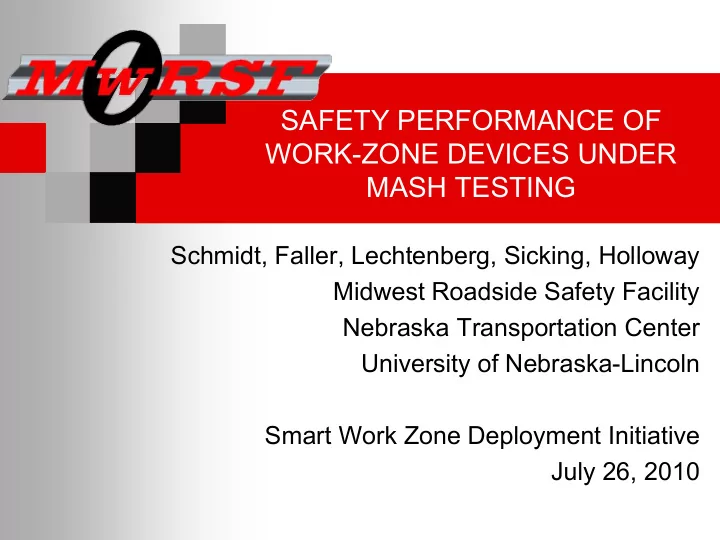

SAFETY PERFORMANCE OF WORK-ZONE DEVICES UNDER MASH TESTING Schmidt, Faller, Lechtenberg, Sicking, Holloway Midwest Roadside Safety Facility Nebraska Transportation Center University of Nebraska-Lincoln Smart Work Zone Deployment Initiative July 26, 2010
Midwest Roadside Safety Facility Background � NCHRP Report No. 350 � Crash test conditions at Test-Level 3 (TL-3) � 1,808-lb small car (820C) 0° Orientation � 22 mph � 62 mph � Normally tested at 0° and 90° orientations � 4,409-lb pickup truck (2000P) not used 90° Orientation
Midwest Roadside Safety Facility Problem Statement � Work zone signs only tested with small car � Systems tuned for small car � Simulated pickup truck tests indicated failure � MASH requires pickup truck testing � Current WZ sign systems may not meet MASH
Midwest Roadside Safety Facility Pickup Truck Bogie Testing ��� Potential for sign to penetrate windshield 4
Midwest Roadside Safety Facility Research Objectives � Determine if current WZ sign systems meet MASH � Identify WZ hardware parameters that increase propensity for failure � Provide guidelines and recommendations
Midwest Roadside Safety Facility Research Plan � Analytical study � Evaluate all full-scale tests � Study individual hardware parameters � Select work zone sign systems with a propensity for failure � Conduct 4 full-scale tests � 2 small car and 2 pickup truck � 2 systems per test � Provide guidelines and recommendations
Midwest Roadside Safety Facility Previous Testing � Small Car Crash Tests � 157 full scale � Pickup Truck Tests � 157 full scale � 18 bogie tests
Midwest Roadside Safety Facility System Parameters
Midwest Roadside Safety Facility Methods of Failure � Severe Windshield Cracking and Failure � Windshield Indentation ≥ 3 inches � Windshield Penetration � Other Occupant Compartment Penetration � Roof Deformation ≥ 4 inches
Midwest Roadside Safety Facility Vehicle Parameters Vehicle Parameter 820C 1100C 2000P 2270P Hood Length [in.] 31.5 34.7 45.1 41 Height to bumper [in.] 18 18 26 27 Height to roof [in.] 58 55.5 73.3 75.8 Windshield Angle 39 32 42 34 Windshield Length [in.] 30.2 28.1 26.8 31.5
Midwest Roadside Safety Facility Predicted Performance � Sign trajectory � Vehicle geometry � Classified by risk of failure � 1: 75-100% � 2: 50-75% � 3: 25-50% � 4: 0-25%
Midwest Roadside Safety Facility Important Parameters for Failure � ≥ 50% of systems with a parameter were predicted to fail for either vehicle � Both Vehicles � Car Only � Height to top of mast � Height to top of flags � Sign panel material � Sign-locking mechanism � Mast stages � Mast material � Truck Only � Flag staff material � Base layout � Orientation 12
Midwest Roadside Safety Facility System Analysis � Systems that were predicted to fail MASH by: � Windshield penetration � Other occupant compartment penetration � Roof deformation � Analyzed systems based on combinations of important parameters
Midwest Roadside Safety Facility Critical Parameters for 2270P Test Failure Low-Mounting Height High-Mounting Height � X-footprint base � X-footprint base � Spring base � Spring base or slipbase � Aluminum and vinyl panel � Aluminum panel � 0 and 90 degree � 90 degree orientation orientations � With flags � With flags � Parallel Dual Uprights � Parallel Dual Uprights � Aluminum panel � Aluminum panel � 90 degree orientation � 0 degree orientation � Without flags � Without flags
Midwest Roadside Safety Facility Critical Parameters for 1100C Test Failure Low-Mounting Height Low-Mounting Height � X-footprint base � Parallel Dual Uprights � Spring base � Aluminum Panel � Flags � 0 and 90 degree orientations � Aluminum panel @ 0 degree orientation � No flags � Vinyl panel @ 90 degree orientation
Midwest Roadside Safety Facility Crash Testing Requirements � MASH Test Level 3 Criteria � 5,000 lb pickup truck, 62 mph � 2,425 lb small passenger car, 62 mph � Evaluation Criteria � Structural Adequacy � Occupant Risk � Vehicle Trajectory
Midwest Roadside Safety Facility Full-Scale Crash Testing � 4 small car tests at 62 mph (Test Designation No. 3-71) � 4 pickup truck tests at 62 mph (Test Designation No. 3-72)
Midwest Roadside Safety Facility WZ09-1A November 25, 2009
Midwest Roadside Safety Facility WZ09-1A � FAILURE
Midwest Roadside Safety Facility WZ09-1B November 25, 2009
Midwest Roadside Safety Facility WZ09-1B � FAILURE
Midwest Roadside Safety Facility WZ09-2A
Midwest Roadside Safety Facility WZ09-2A � PASS
Midwest Roadside Safety Facility WZ09-2B
Midwest Roadside Safety Facility WZ09-2B � FAILURE
Midwest Roadside Safety Facility WZ09-3A
Midwest Roadside Safety Facility WZ09-3A � FAILURE
Midwest Roadside Safety Facility WZ09-3B
Midwest Roadside Safety Facility WZ09-3B � PASS
Midwest Roadside Safety Facility WZ09-4A
Midwest Roadside Safety Facility WZ09-4A � FAILURE � Windshield penetration � Floorboard penetration
Midwest Roadside Safety Facility WZ09-4B
Midwest Roadside Safety Facility WZ09-4B � PASS
Midwest Roadside Safety Facility Test Summary � 3 of the 8 systems passed MASH evaluation criteria � 3 of the 4 systems failed with the pickup truck � 2 of the 4 systems failed with the small car � Comparing systems with similar parameters can be difficult
Midwest Roadside Safety Facility Important for MASH Failure � Designers cautioned against using important parameters Parameter Pickup Truck Small Car Aluminum* Aluminum* Sign Panel Material 75-135 in. 59-110 in. Height to Top of Mast Without Flags With and Without Flags Presence of Flags Both 0 and 90 degrees Both 0 and 90 degrees Orientation Sign Locking NA Rigid Brackets Mechanism X-footprint NA Base Layout *Aluminum sign panels should be tested with reflective sheeting
Midwest Roadside Safety Facility Design Aides 1 2 1 Breakaway Mechanism Height: Low ≤ 24”, High > 24” or no breakaway mechanism 2 Chance of Failing MASH: 1 - 75 to 100%, 2 – 50 to 75%, 3 – 25 to 50%, 4 – 0 to 25%, 5 – Unknown
Midwest Roadside Safety Facility Acknowledgements � Center for Transportation Research Education at Iowa State � Mid-America Transportation Center � Private Industry
Recommend
More recommend